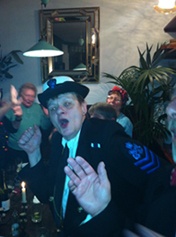I told Dorothy there were only 50 tickets left for Sing Sing Sing at The New Theatre Royal on February 2nd. This was her response…

WHAT DOES THIS STRANGE GURNING MEAN? EXPERTS ARE DIVIDED. TO FIND OUT FOR YOURSELF, GRAB ONE OF THE LAST TICKETS AT THE NEW THEATRE ROYAL, OR REMAIN PUZZLED FOR THE REST OF YOUR LIFE!





 Betty – rich, impulsive, living for the moment. Betty is neither good nor bad, but a bundle of self-interest whose real pay-off in life is enjoying the now. She’s also a Polar Responder. If you tell her she can’t do something, she’ll do it, just to prove you’re wrong. It makes her morally complex, and at times unpredictable – both in her thoughtlessness and her generosity. She is exciting because of it, prone to daydreaming and being creative – and is also morally ambiguous and certainly not the best person to go to for advice.
Betty – rich, impulsive, living for the moment. Betty is neither good nor bad, but a bundle of self-interest whose real pay-off in life is enjoying the now. She’s also a Polar Responder. If you tell her she can’t do something, she’ll do it, just to prove you’re wrong. It makes her morally complex, and at times unpredictable – both in her thoughtlessness and her generosity. She is exciting because of it, prone to daydreaming and being creative – and is also morally ambiguous and certainly not the best person to go to for advice. Gail – poor, smart, feisty – she’s a redhead who will put you in your place if you step out of line. Gail is your salt of the Earth working class gal, who says what’s on her mind. She’s all too aware of her vulnerability in a world in which her hometown is being flattened around her. Unlucky in love, she’s looking for a man who can do right by her, and although she is at times hostile to “Lady Muck” Betty, she also knows Betty has a certain careless charm that she wants to learn. Watch out for Gail losing her temper – because when she blows her stack, it’s nuclear.
Gail – poor, smart, feisty – she’s a redhead who will put you in your place if you step out of line. Gail is your salt of the Earth working class gal, who says what’s on her mind. She’s all too aware of her vulnerability in a world in which her hometown is being flattened around her. Unlucky in love, she’s looking for a man who can do right by her, and although she is at times hostile to “Lady Muck” Betty, she also knows Betty has a certain careless charm that she wants to learn. Watch out for Gail losing her temper – because when she blows her stack, it’s nuclear. Dorothy – A sweet-natured and honest young middle class woman who has just married, and whose man is away fighting. Dorothy is steady, reliable and caring. She has a sweet generosity in her nature that is fed by her faith. She always sees the good in people, and trusts in Providence that things will work out right. She loves Gail and Betty very much, and although she sometimes becomes exasperated with the latter, she maintains an optimism that Betty will grow and mature in time to become a moral person. Whether she is right, needs to be seen!
Dorothy – A sweet-natured and honest young middle class woman who has just married, and whose man is away fighting. Dorothy is steady, reliable and caring. She has a sweet generosity in her nature that is fed by her faith. She always sees the good in people, and trusts in Providence that things will work out right. She loves Gail and Betty very much, and although she sometimes becomes exasperated with the latter, she maintains an optimism that Betty will grow and mature in time to become a moral person. Whether she is right, needs to be seen!



